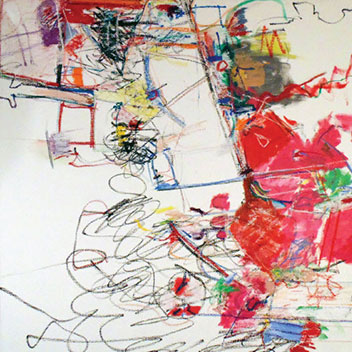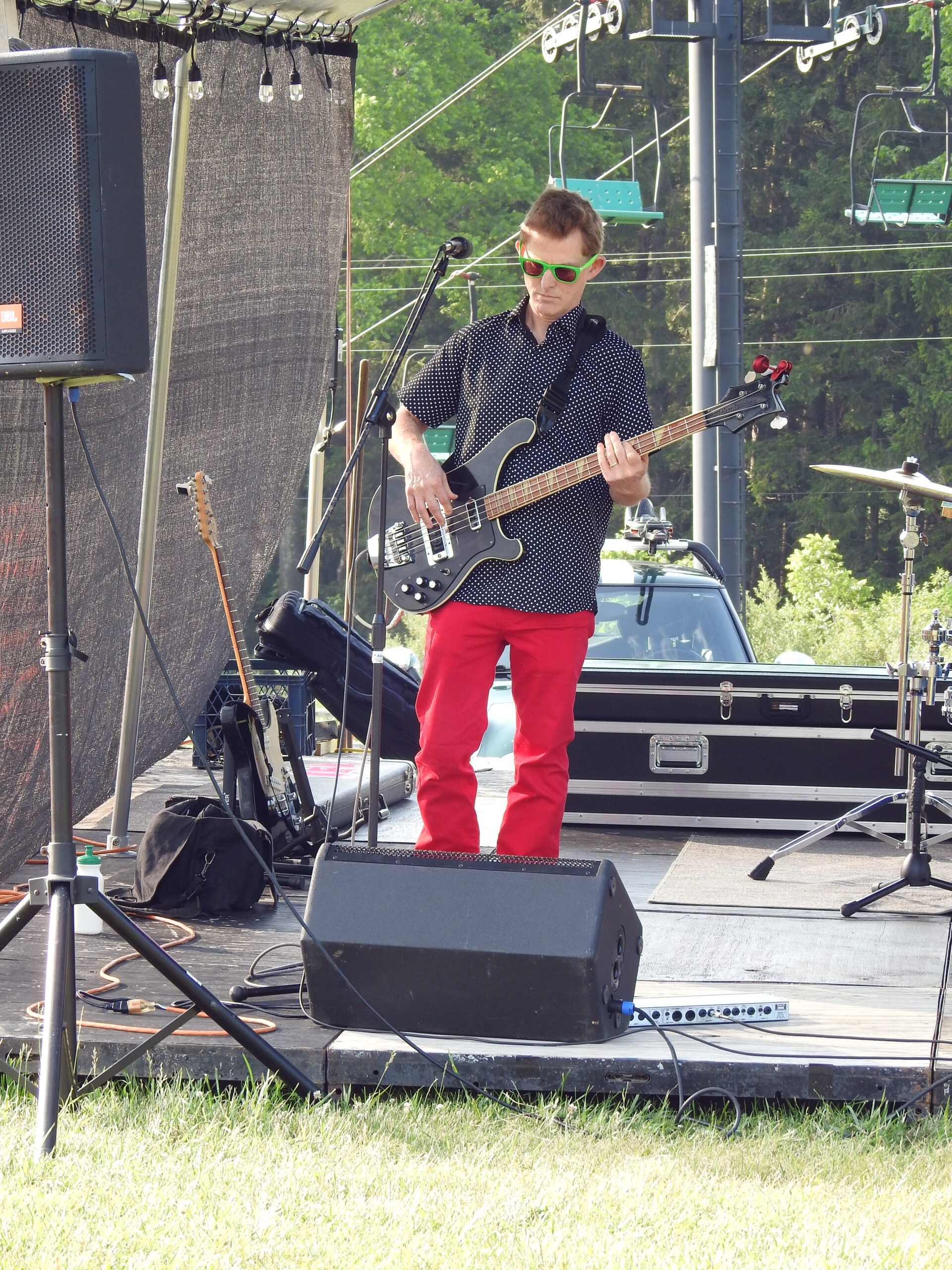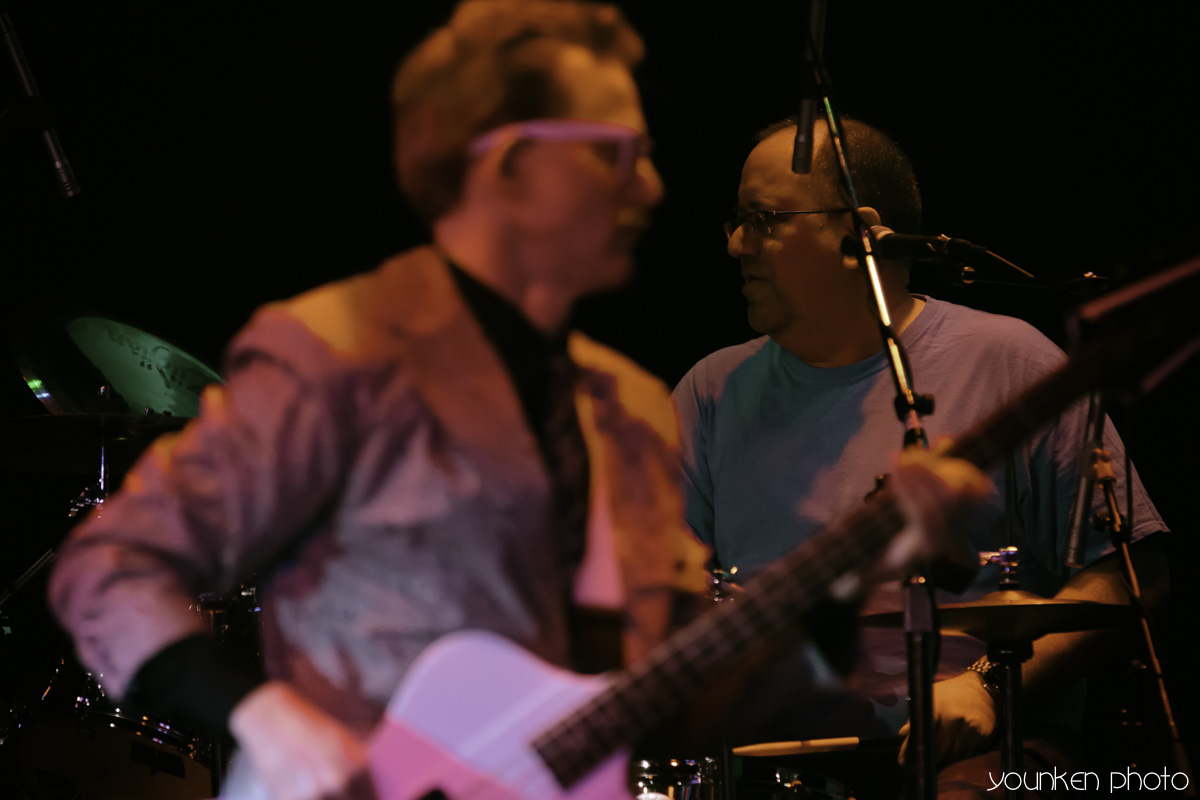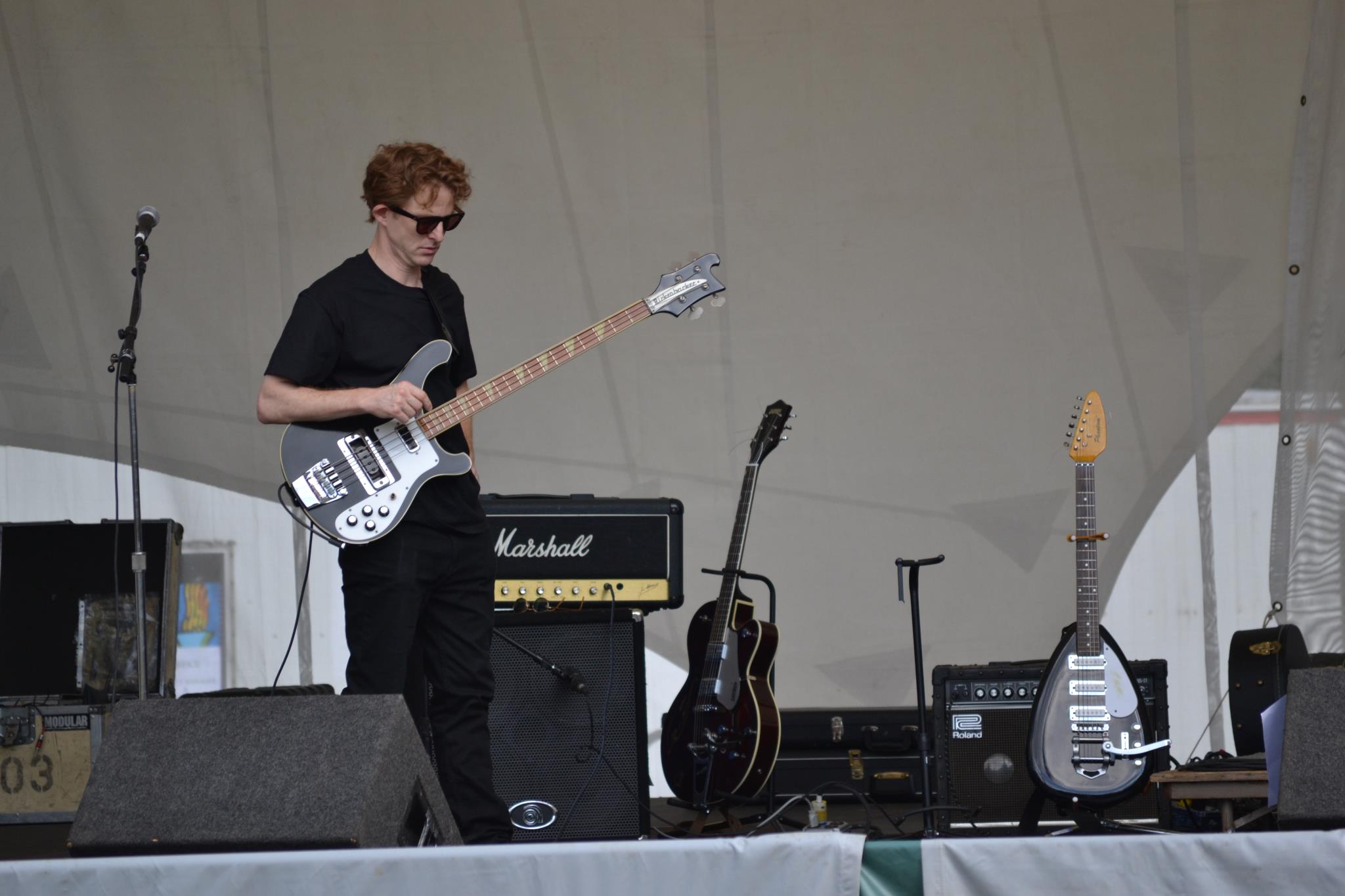The Long Afternoon’s New Album “Regression” Targets Broad Audience
“Regression is for everyone,” said The Long Afternoon’s director of corporate relations, Ginger M. Armalade.
FOR PUBLIC RELEASE JULY 30, 2016
NOVOSIBIRSK, Russia — Cryptic indie rock organization The Long Afternoon is preparing to release its fourth album, Regression, in August 2016, with an all-inclusive approach that leaves no listener left behind.

The cover art from Regression, the fourth album by The Long Afternoon.
“Regression is for everyone,” said the Long Afternoon’s director of corporate relations, Ginger M. Armalade, in a press conference. “Whether you are an Afghani carpet weaver honing the point of your qulab, an Albanian vintner at harvest, gently laying dewey clumps of golden Shesh i Barhe grapes in a cane basket balanced on the top rung of a weather-beaten ladder, an Algerian shipping manager watching the sun set out the window of your office overlooking Jijel, an Andorran cattleherd sitting cross-legged on an outcropping of sandstone wondering what it’s like to ski, an Angolan tribal wife admiring silver bracelets at a street stall in Huambo, an Antiguan girl swimming in the warm blue water at Willikies, an Argentinian of Spanish descent staring at the steam rising over the surface, elliptical from this angle, of a mug of coffee beside a folded copy of El Argos, an Armenian at church, praying almost inaudibly to a brown icon in a small dim chapel smelling of cedarwood and wax, an Australian native, relaxing after a successful kangaroo hunt, basking in a hammock bathed by the antipodean sun, or an Austrian Hausfrau wiping up, with a checked waffle-knit rag made at a factory in Salzburg, the warm milk just split by her two-year old son, howling disconsolately at her elbow, The Long Afternoon’s new album has been designed to specifically to consist of sounds that you are able to listen to and hear at your convenience.”
Armalade refused to confirm or deny reports that the new album took nearly five years to produce because the organization’s team of researchers conducted pioneering field tests in locations across the globe. “It took that long to produce because the production team and quality control division were focused on every last detail, and that level of attention permeates the product and enhances its appeal,” she says, “Let’s say you’re an Azerbaijani fisherman mending nets on the fish-slimy deck of a trawler at anchor thirty kilometers off the coast of Baku, a Bahamian bus driver taking a turn slowly so that two tourists on rented red bikes—Americans to judge by their hats—have room to stop for photos of the bay, a Bahrainian osteopath telephoning a colleague about a patient whose recovery is medically inexplicable, a Bangladeshi sorting Lalpakri potatoes at a plant in Kumirpur, a Barbados teenage girl putting on lipstick in front of a white dressing table, thinking about the Arawak Indians for a project at school, a Belorussian convict using a tongue depressor to carve a dog that looks like a bull out of soap, a Belgian infant sitting warmly in a stroller while her mother buys veal from a butcher on the rue du Lac, a Mayan native of Belize harvesting sugarcane with a rusty machete, then pausing to chase away a persistent sand fly, a Fon truckdriver waiting in an old Ford truck idling beside an unpaved road overlooking a forested plateau, from which smoke rises, in Benin, a Bhutanese nun placing a coin, worn almost smooth, onto the open palm of a bald Buddhist beggar, his freshly shaven head specked with tiny black nodules of dried blood, a Bolivian mining zinc outside La Paz, a Bosnian radio commentator clearing her throat during a furniture commercial, a Botswanian diamond merchant polishing the left lens of his German eyeglasses with a square of black velvet, a Brazilian eight-year- old looking at a picture book about tropical plants, a Bruneian soldier checking the passport of a Chinese visitor named Yurong Liu, a Bulgarian archaeologist researching Thracian goldwork at a library in Varna, a woman lying in bed in Burkino Faso watching a Mexican soap-opera subtitled in French, an elderly Twa in Burundi eating boiled manioc at dawn, a young Cambodian mother guiding a wooden plow behind an emaciated ox, the linked pair moving slowly and laboriously across a muddy field, a Cameroonian adolescent stitching a wallet of brown leather, a Canadian member of the House of Commons leaving the women’s restroom at an airport in Saskatchewan, a schoolteacher from Cape Verde translating a children’s poem from Criuolo into Portuguese, a priest in the Central African Republic saying mass, a Chadean woman holding a young child on her angular hip, watching with uncomprehending eyes the construction of a pipeline through the forest, or a Chilean highlander lingering over a midday meal of humitas and charquican, anticipating an afternoon of foraging in the Andean foothills, this album includes carefully selected, sinusoidal plane-waves that will be clearly recognizable as an addition to the environment.”
Armalade does not expect the controversy surrounding the organization’s ambiguous goals to affect the potential size of the global demand for new pulse-code modulations contained on this new release. “A Chinese metalworker, smoked hood down, temporarily anonymous, welding steel plates for the undercarriage of an earthmover that will be sold to an Australian construction firm, a Colombian vagabond walking from Bogotà to Villavicencio on worn-out sandals, an inhabitant of Comoros gathering ylang-ylang flowers for perfume, a Congolese grandfather suffering from sleeping sickness lying motionless in a grass hut beside a river, a Pygmie woman in the rainforest of the Democratic Republic of the Congo collecting brightly colored lizards, a Costa Rican testing a newly manufactured microprocessor, a local government official in Côte d’Ivoire stamping a building permit, a Croatian outlaw roasting goat meat in a cave in the Dinaric Alps, a Cuban girl dying of leukemia in a hospital in Santiago, a Cypriot farmer tasting a green olive, a Czech writer pausing over a word, a Danish newborn, wailing, hanging upside-down by the ankles from a masked ostetrician’s closed hand, a Djiboutian scolding a camel who refuses to rise, a Domincan accountant calculating banana revenues with a calculator made in Texas, a Hispaniolan from the Dominican Republic hosing off a car in the newly paved driveway of a single-storey white house, an Ecuadoran on a steamer en route to the Galápagos Islands, writing a book in her head, an Egyptian textile worker smoothing folded cotton cloth, a Salvadoran guerilla waiting out a storm under a make-shift lean-to in the hills above Zacatecoluca, an Equatorial Guinean picking a cocoa bean, an Eritrean leaving a church on a hot January morning, an Estonian painting a porcelain cup, an Ethiopian dreaming about the sea, a Fijian woman counting change, a Finn cross-country skiing to work, a French schoolgirl milking a cow at 5:37 a.m. while Edith Piaf sings tinnily from a radio at the other end of the low enclosure, a Gabonese writing a letter with a ballpoint pen borrowed momentarily from a friend and not yet returned, a Gambian grandmother dressing a toddler, a Georgian tying a leather boot lace, a German librarian running the tip of his index finger down a column of small type to the word Produktionsgenossenschaft, a Ghanian smelting aluminum, a Greek sniffing feta cheese at a market on Corfu, a Grenadan stroking a black cat’s arched back, a Guatemalan pickpocket filching a wallet made in Cameroon, a Guinean shearing a brown ewe, a Guinea-Bissauan shelling cashews, or a Guyanan journalist sharpening a pencil—they’re all equally likely to have aural nerves react to the new album by The Long Afternoon. It’s just physics.”
In fact, it is The Long Afternoon’s strict adherence to working within the realm of known physical laws that have fueled the new album’s potential appeal to so diverse an array of individuals. “When it’s playing within your earshot, this is a work that can be heard by a Haitian dock worker stacking dusty sacks of flour, a Honduran fisherman checking lobster traps, a Hungarian waitress clearing a table in Glamor, a bar that has just closed for the night, an Icelandic seamstress mending a flag while listening to a Scottish radio station based in the Hebrides, an Indian Muslim unrolling a prayer rug at dawn, an Indonesian musician rehearsing in a sandalwood-scented room with a bamboo floor, an Iranian imam, breathing heavily through his nose, climbing a minaret’s spiral stairs, an Iraqi nurse taking the pulse of an old woman who’s asleep, facing the wall, an Irish gypsy turning the squeaking tuning peg of a homemade guitar, an Israeli shopkeeper raising a metal storefront gate, an Italian baby feeding at his mother’s breast while she rocks in a chair before a window looking out over the sea, a Jamaican high school student planting tree saplings on an estate outside Siloah, a Japanese automobile assembly-line worker checking a door seal, a Jordanian peddler sitting beside a pile of colorful carpets in the midday sun, a Kazakhstani kneading bread dough, a malarial Kenyan, his black face beaded with sweat, repairing a bridge washed out by a flooding stream, a Kiribati gathering seaweed for export, a North Korean slaughtering a chicken behind a shack, joking loudly all the while with her husband inside, a South Korean civil servant checking a dial at a hydroelectric power plant near Pusan, a Kuwaiti sheik dialing the phone number of a petrochemical plant, a Kyrgyz nomad smuggling narcotics across the mountainous border into Tajikistan, a Laotian defecating behind a tree at the edge of a forest, a Latvian pharmacist sorting pills, a Lebanese terrorist plotting a raid on a hand-drawn map, a Lesothan prostitute buckling her faux-leather belt in a dim hotel room, a Liberian mail carrier handing a soiled postcard to a smiling child, a Libyan packing dates into a small wooden box lined with waxed paper, a prince in Liechtenstein signing a trade agreement with a Mont Blanc pen, a Lithuanian circus acrobat with chalky palms practicing a high-wire routine with two other women in black tights, a Luxembourgeoise cooking barley groats, a Macedonian child poking a dead squirrel with a stick, a maid with cholera in Madagascar coughing on a bed beside a dirty window, a Malawi chemistry professor walking along the shore of Lake Chilwa near Zomba, a Malaysian antiques dealer affixing a patch of green felt to the bottom of a brass sculpture of the Buddha, a Maldivian oceanographer measuring the water temperature of the lagoon of the Miladummadulu Atoll, a hiker in Mali wandering lost in the desert, a Maltese police officer lecturing a careless motorist in front of the airport at Luqa, a native of the Marshall Islands gathering tochus shells to make buttons, a Mauritanian mechanic changing the oil of an old Citroën, a Mauritian software engineer opening a canister of tea, a Mexican transsexual on a flight from Puebla to Minneapolis, or a Micronesian train conductor chewing gum and reading a newspaper on a bench in a deserted provincial station on Chuuk.”
Armalade refused to answer questions about the potential size of the audience for the record, but she noted that the people who hear it will be individuals who live their own unique lives. “It could be a Moldovan farmgirl getting dressed on a cold March morning while a tabby cat sleeps curled on a counterpane nearby, a Monégasque lifeguard coiling a rope, a Mongolian schoolteacher asking a question about Peru, a Moroccan cobbler repairing a leather sandal, a Mozambiquian three-year-old chewing the hem of a dirty towel, a Myanmaran cleaning prawns, a Namibian meat packer packing frozen cuts of beef, a Nauruan grating coconut, a Nepalese widower leading a yak, three children, and a dog across a mountain pass, a Dutchman pulling a nail, a New Zealand Maori canoeing toward shore, a Nicaraguan grocer stacking oranges on a red plastic tray, a Nigeri child throwing stones into a puddle in the courtyard of a single-storey cinderblock building painted canary yellow, a Nigerian mayor rolling a cigarette on his office desk blotter, a Norwegian trucker en route from Oslo to Bergen, an Omani coaxing a donkey to turn, a Pakistani shaving, a Palauan drawing pictures in the sand, a Palestinian sanding an olive-wood salad serving spoon, a Panamanian brewer sniffing hops, a Papua New Guinean riverboat pilot watching the rain forest drift by, a Paraguayan baby, born prematurely, sleeping fitfully in an incubator on the third floor of a hospital in Asunción while her mother prays on the other side of a glass wall, a Peruvian linesman repairing a phone line in a poor northern suburb of Lima, a black-haired Philippine girl assembling a radio at a plant in Manila, a Polish neurosurgeon listening to Bach’s Passacaglia and Fugue in C major before bed, a Portuguese schoolboy daydreaming simultaneously about tending goal and about a girl named Marta sitting two rows up, a Qatari manufacturer inspecting a stack of steel bars, a Romanian pornographer directing a naked couple simulating sex, a Russian hotel housekeeper scrubbing a toilet, a Rwandan grandfather stroking a child’s tightly curled hair, a tobacco farmer from St. Kitts and Nevis shampooing her hair, a St. Lucian cleaning up after his terrier, a citizen of St. Vincent and the Grenadines washing sweet potatoes at an outdoor pump, a Samoan woman casting a vote, a Sammarinese turning a radio dial to clarify the reception of an opera being broadcast live from La Scala, a weightlifter from São Tomé and Príncipe sliding a forty-pound cast iron disc onto the end of a steel bar, a Sa’udi Bedouin walking a lonely seven miles into the Persian Gulf on the Dammam port causeway, a Senegalese construction worker nursing a beer at a bar in Dakar, a Seychellois opening a can of fish, a twelve-year old girl from Sierra Leone buying cigarettes, a Singaporean biochemist examining a petri dish under infrared light, a Slovakian blowing his nose, a Slovenian chopping oak logs for firewood, a Solomon Islander trying to make sense of a scribbled note found affixed with tape to her office door, or a Somalian, on his haunches, drinking muddy water from his cupped hand.”
Armalade stressed once again that The Long Afternoon’s ultimate aims, which may be clear only to the organization’s leadership, do not preclude anyone from experiencing the vibrations that are generated whenever the material that appears on the Regression album are reproduced, even mechanically. She noted that the potential targets for the experience include “a South African ranch hand shoeing a horse, a Spanish baker rinsing a shop window with a hose, a Sri Lankan preschool teacher comforting a crying child, a Sudanese slave playing cards, a Surinamese plucking a chicken, a Swazilander waiting in a doctor’s office, a Swede sharpening the blade of a hockey skate, a Swiss photojournalist examining a wet print, a Syrian toddler bending to pick up a stone on the beach at Baniyas, a Taiwanese bank manager opening a safe deposit box, a Tajik patrolling the border with a pair of Soviet-made binoculars and an old but still serviceable Kalashnikov, a Tanzanian cartoonist brushing away, with the edge of his hand, eraser crumbs, a Thai restauranteur seating a customer, a Togan office worker fiddling with a paperclip while talking on the phone with her husband, a Tongan newspaper delivery boy sipping iced coffee at a roadside stall, and a girl from Trinidad and Tobago walking hand in hand with her boyfriend along the beach at night.”
Asked who else Regression was for, Armalade immediately responded, “If you’re a Tunisian brushing sand from the sleeve of his robe, a Turk midwife rinsing cotton towels in a tin basin of clouded hot water, a Turkmen raising a dome-shaped tent, a Tuvaluan snorkeling over the reefs off Nanumaga, a Ugandan general tying his left shoe, a Ukrainian saxophonist playing a B-flat, re-wetting his reed, and sounding the note again, an Emirian fighter pilot inspecting the undercarriage of a Lockheed Martin F-16, a British UFO researcher interviewing a sheep farmer in Hertfordshire (“What color were the lights?”), an American police sergeant frisking a suspect standing legs outspread and palms planted against a cyclone fence encircling a wrecking yard, an Uruguayan television producer reviewing a script, an Uzbek eating soup, a Vanuatuan forester felling a tree, an inhabitant of Vatican City walking at five minutes past noon through the Old Gardens toward the northwest wing of the Academy of Sciences building, a Venezuelan flying a kite, a Vietnamese mortician preparing the body of an old woman for burial, a Saharawi sitting placidly in the sun, a Yemeni woman boning a fish, a Yugoslavian diving clumsily into an above-ground swimming pool behind a house in a suburb of Novi Sad, a Zambian washing her baby, or a Zimbabwean boat pilot steering a barge transporting chrome ore from Harare to Mozambique, this album is for you.”
The Long Afternoon’s dedication to producing an album that can be heard by everyone has led some to question whether there is anyone whose sensibilities and preferences the organization did not consider during the design and production phases of the Regression initiative. Asked this question directly, Armalade paused for a moment. When she responded, a slight edge had entered her otherwise calm tone. “Music industry executives,” she said.
###






